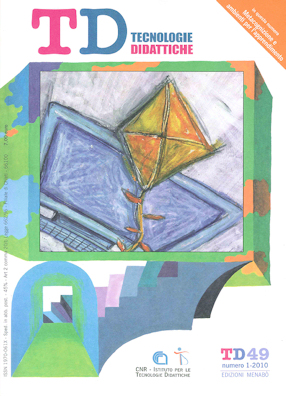Progettare supporti cognitivi per l'apprendimento con ipermedia
Contenuto principale dell'articolo
Abstract
Dettagli dell'articolo
Sezione
Gli autori che pubblicano su questa rivista accettano le seguenti condizioni:
- Gli autori mantengono i diritti sulla loro opera e cedono alla rivista il diritto di prima pubblicazione dell'opera, contemporaneamente licenziata sotto una Licenza Creative Commons CC BY 4.0 Attribution 4.0 International License.
- Gli autori possono aderire ad altri accordi di licenza non esclusiva per la distribuzione della versione dell'opera pubblicata (es. depositarla in un archivio istituzionale o pubblicarla in una monografia), a patto di indicare che la prima pubblicazione è avvenuta su questa rivista.
- Gli autori possono diffondere la loro opera online (es. in repository istituzionali o nel loro sito web) prima e durante il processo di submission, poiché può portare a scambi produttivi e aumentare le citazioni dell'opera pubblicata (Vedi The effect of Open Access).
Riferimenti bibliografici
Amthauer R., Brocke B., Liepmann D., Beauducel A. (1999). IST 2000 - Intelligenz-Struktur-Test 2000. Göttingen: Hogrefe.
Astleitner H. (1997). Lernen in Informationsnetzen. Theoretische Aspekte und empirische Analysen des Umgangs mit neuen Informationstechnologien aus erziehungswissenschaftlicher Perspektive. Frankfurt: Europäischer Verlag der Wissenschaften.
Azevedo R. (2009). Theoretical, conceptual, methodological, and instructional issues in research on metacognition and self-regulated learning: a discussion. Metacognition and Learning, 4, pp.87-95.
Bannert M. (2007). Metakognition beim Lernen mit Hypermedia. Erfassung, Beschreibung und Vermittlung wirksamer metakognitiver Lernstrategien und Regulationsaktivitäten. Münster: Waxmann.
Bannert M. (2009). Promoting self-regulated learning through prompts: A discussion. Zeitschrift für Pädagogische Psychologie. 23(2), pp.139-145.
Bannert M. e Mengelkamp C. (2008). Assessment of metacognitive skills by means of instruction to think aloud and reflect when prompted. Does the verbalisation method affect learning?. Metacognition and Learning, 3(1), pp.39-58.
Bannert M., Reimann P. (submitted). Supporting self-regulated hypermedia learning through prompts. Instructional Science.
Beaseley R. E., Wangh M. L. (1995). Cognitive mapping architectures and hypermedia disorientation: An empirical study. Journal of Educational Multimedia and Hypermedia (4), pp.239-255.
Boekaerts M. (1997). Self-Regulated Learning: A New Concept Embraced by Researchers Policy Makers, Educators, Teachers, and Students. Learning and Instruction, 7(2), pp.161-186.
Brown A. L. (1978). Knowing when, where, and how to remember: a problem of metacognition. In R. Glaser (eds.). Advances in Instructional Psychology. Hillsdale, NJ: Erlbaum, pp. 77-165.
Dillon A., Gabbard R. (1998). Hypermedia as an educational technology: a review of the quantitative research literature on learner comprehension, control, and style. Review of Educational Research, 68, pp.322-349.
Flavell J. H., Wellman H. M. (1977). Metamemory. In R. Kail & W. Hagen (eds.). Perspectives on development of memory and cognition. Hillsdale, NJ: Erlbaum, pp. 3-31.
Friedrich H. F., Mandl H. (1992). Lern- und Denkstrategien – ein Problemaufriß. In H. Mandl & H. F. Friedrich (eds.), Lern- und Denkstrategien. Analyse und Intervention. Göttingen: Hogrefe, pp. 3-54.
Hasselhorn M. (1992). Metakognition und Lernen. In G. Nold (Ed.), Lernbedingungen und Lernstrategien. Welche Rolle spielen kognitive Verstehensstrukturen?. Tübingen: Gunter Narr Verlag, pp. 35-63.
Hasselhorn M. (1995). Kognitives Training: Grundlagen, Begrifflichkeiten und Desirate. In W. Hager (ed.), Programme zur Förderung des Denkens bei Kindern. Göttingen: Hogrefe, pp. 14-40.
Hermans H., Petermann F., Zielinski W. (1978). LMT - Leistungsmotivationstest. Amsterdam: Swets & Zeitlinger.
Hill J. R., Hannafin M. J. (1997). Cognitive Strategies and Learning from the World Wide Web. Educational Technology Research & Development, 45, pp.37-64.
Jacobson M. J., Maouri C., Mishra P., Kolar C. (1996). Learning with hypertext learning environments: Theory, design and research theory, design and research. Journal of Educational Multimedia and Hypermedia, 5(3/4), pp.239-281.
Kramarski B., Feldman Y. (2000). Internet in the classroom: Effects on reading comprehension, motivation and metacognitive awareness. Educational Media International, 37(3), pp.149-155.
Lawless K. A., Brown S. W. (1997). Multimedia learning environments: Issues of learner control and navigation. Instructional Science, 25, pp.117-131.
Lin X., Lehman J. D. (1999). Supporting Learning of Variable Control in a Computer-Based Biology Environment: effects of prompting college students to reflect on their own thinking. Journal of Research in Science Teaching, 36 (7), pp.837-858.
Lin X., Hmelo C., Kinzer C. K., Secules T. (1999). Designing technology to support reflection. Educational Technology Research and Development, 47(3), pp.43-62.
Rouet J. F., Levonen J. J. (1996). Studying and learning with hypertext: empirical studies and their implications. In J. F. Rouet, J. J. Levonen, A. Dillon, R. J. Spiro (eds.), Hypertext and cognition. Hillsdale, NJ: Erlbaum, pp. 9-23.
Schneider W. (1996). Zum Zusammenhang zwischen Metakognition und Motivation bei Lern- und Gedächtnisvorgängen. In C. Spiel, U. KastnerKoller, P. Deimann (eds.), Motivation und Lernen aus der Perspektive lebenslanger Entwicklung. Münster: Waxmann, pp. 121-134.
Schnotz W. (1998). Strategy-specific information acccess in knowledge acquisition from hypertext. In L.B. Resnick, R. Säljö, C. Pontecorvo, B. Burge (eds.), Discourse, Tools, and Reasoning. Essays on Situated Cognition. Berlin: Springer.
Sweller J., van Merrienboer J., Paas F. (1998). Cognitive architecture and instructional design. Educational Psychology Review, 10(3), pp.251-296.
Tergan S.-O. (2002). Hypertext und Hypermedia: Konzeption, Lernmöglichkeiten, Lernprobleme und Perspektiven. In L. J. Issing, P. Klimsa (Hrsg.), Information und Lernen mit Multimedia und Internet. Weinheim: PVU, pp. 99-112.
Unz D. C., Hesse F. W. (1999). The use of hypertext for learning. Journal of Educational Computing Research, 20, pp. 279-295.
Veenman M. V. (1993). Metacognitive ability and metacognitive skill: Determinants of discovery learning in computerized learning environments. Amsterdam: University of Amsterdam.
Veenman M. V. J. (2007). The assessment and instruction of self-regulation in computer-based environments: a discussion. Metacognition and Learning, 2, pp.177-183.
Weinert E. (1994). Lernen lernen und das eigene Lernen verstehen. In K. Reusser, M. Reusser-Weyeneth (eds.), Verstehen – Psychologischer Prozeß und didaktische Aufgabe. Bern: Huber Verlag, pp. 183-205.
Wild K.P., Schiefele U., Winteler A. (1992). LIST. Ein Verfahren zur Erfassung von Lernstrategien im Studium. (Gelbe Reihe: Arbeiten zur Empirischen Pädagogik und Pädagogischen Psychologie, Nr. 20). Neubiberg: Universität der Bundeswehr, Institut für Erziehungswissenschaft und Pädagogische Psychologie.

